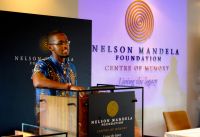The atmosphere is tense in the auditorium at the Nelson Mandela Foundation. The audience of mainly teenagers from high schools around the country is concentrating ferociously as Siyabonga Mtshali counts off points quickly and forcefully, summing up his team’s arguments in the final of the inaugural Nelson Mandela Debating Challenge.
Mtshali and his team from KwaZulu-Natal’s Mountview Secondary School are up against a team from Capricorn Secondary from Limpopo province. The teams are debating whether popular policies such as land expropriation without compensation and nationalisation of the South Africa’s mines and banks are relevant when the aim is poverty alleviation.
Unlike the debates you see in Parliament, which are punctuated with loud, sometimes disruptive reactions from the audience, the room is silent, apart from each speaker’s voice. The audience reacts with “silent cheers” (waving their hands in a soundless clapping motion) and members of the opposing team object to points by standing up and raising their hands to attract the speaker’s attention. They only speak if they’re given leave to by speaker.
The skills on display from the six young speakers (three from each team) are formidable, and their performances are impressive. In the end, in a very tight contest (the judges’ vote was 4-3), the team from KwaZulu-Natal (KZN) is declared the winner.
“You are debating the very issues that we debate all the time at the Nelson Mandela Foundation,” Foundation CEO Sello Hatang tells participants at the end of the action-packed finale.
“You’re debating the very issues that the country struggles with on a daily basis. You were dealing with difficult issues that have seen people in Parliament throwing bottles and chairs just to get their point across. You demonstrated today that we can disagree, but do it in a more civil way that is still constructive and can take the country forward.”
And therein lies the relevance of debating to contemporary South African politics. It forces those with opposing viewpoints to make their points reasonably and with evidence, and to listen and respond to those on the opposing side.
Civil society group Tshimong teamed up with the Nelson Mandela Foundation to host the debating tournament. Unlike other tournaments, which tend to focus exclusively on technical debating skills, Tshimong’s programme encourages debaters to use their skills to lead conversations around leadership and development in South Africa.

Thami Pooe, Tshimong managing director.
(Image: NMF)The six-day programme saw high school students from all provinces spend a week taking an in-depth, critical look at South Africa’s history and debating the legacy of Nelson Mandela. By visiting sites like the Apartheid Museum, a children’s home in Johannesburg and exploring the archive at the Foundation, the students have been exposed to Madiba’s journey as an activist, a president and a philanthropist.
“This is the first time we made a deliberate effort to amalgamate debating and leadership in one programme,” says Tshimong’s managing director, Thami Pooe.
“These young people are not only debaters; they are advocates for change. They are advocates for their communities and they are going to be carrying the cross and the burden of the poor. That would never have been activated if this was a regular debating tournament.”
The two teams that made it to the final of the tournament have been awarded a very special honour. They’ve been invited to a private dinner with the prominent individual who will deliver the 2018 Nelson Mandela Annual Lecture (we have a very exciting speaker this year – watch this space for the big reveal!).
Previous speakers have included technology titan and philanthropist Bill Gates; Archbishop Emeritus Desmond Tutu; former US President Bill Clinton; and Nobel laureate Wangari Mathaai.
In addition, the teams have also been awarded a tour of Robben Island, as well as books from the Foundation and gifts from one of the sponsors of the tournament, CNA.
Robert Mathenjwa, a member of the winning team, Mountview Secondary School, says the detailed look at Mandela’s life has made him rethink his perceptions about Mandela.
“I’ve gotten a much better understanding of why our country is the way it is. I’ve changed my ideas around Nelson Mandela as a President, and what I saw as his inability to nationalise [mines] and his ability to create things like the Truth and Reconciliation Commission. After this tournament I was able to understand why those things were instituted in the first place.”
Teammate Thea Earnest says the programme has gone beyond debating skills. “The type of conversations we’ve had as debaters has influenced how we think about the world and how we perceive the world,” she says.
For Mtshali it wasn’t just about winning, but also about forming connections.
“What I gained is fun and friends from different backgrounds and I think that’s what Nelson Mandela wanted at the end – that beyond our racial backgrounds, beyond our ethnicities, we can still have fun and we can still communicate.”
The team’s Unam Mjoli can’t wait to use the skills she has learnt to make a difference.
“We can never stop questioning authority, we can never stop questioning legislation. We’re not going to stop. Debating is something that has to live on.”
And it’s this idea of sharing the knowledge they have learnt as widely as possible that Hatang wants the young debaters to remember.
“I’m now putting pressure on you. That whatever was done for you should then be invested in those who are still to be born. We didn’t do anything just for you; we did it for your community and for your families, who I hope will be very proud.”
Watch a video about the event here:
